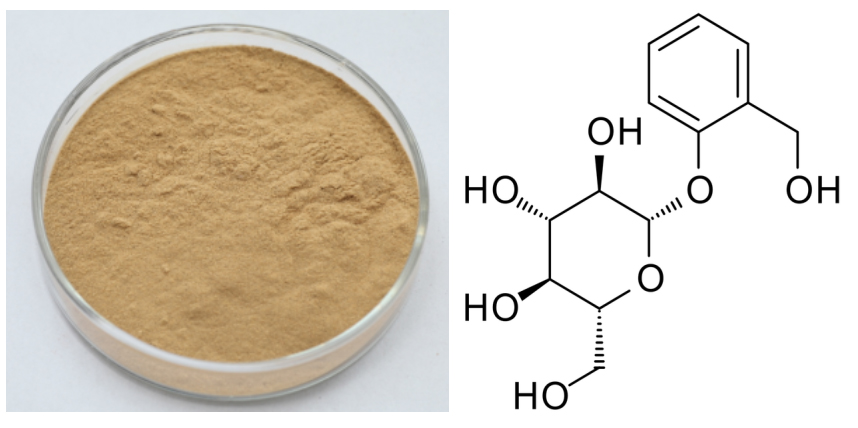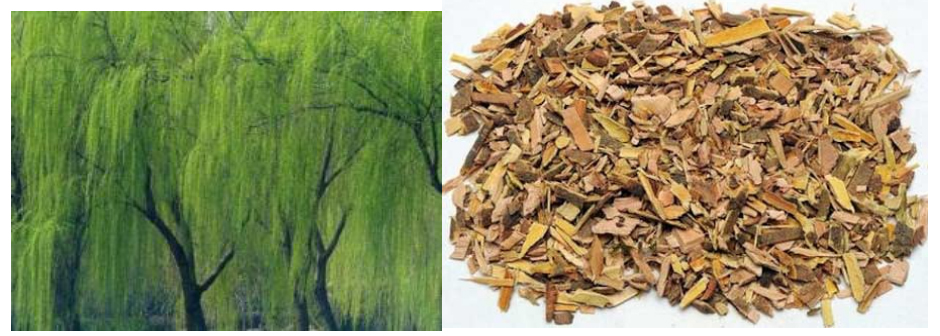Hot Selling for White Willow Bark Extract Belgium
Hot Selling for White Willow Bark Extract Belgium Detail:
[Latin Name] Salix alba L.
[Plant Source] from China
[Specifications] Salicin 15-98%
[Appearance] Yellow Brown to White powder
Plant Part Used: Bark
[Particle size] 80 Mesh
[Loss on drying] ≤5.0%
[Heavy Metal] ≤10PPM
[Storage] Store in cool & dry area, keep away from the direct light and heat.
[Shelf life] 24 Months
[Package] Packed in paper-drums and two plastic-bags inside.
[Net weight] 25kgs/drum
Brief Introduction
Salicin is a naturally occurring compound found in the bark of several species of trees, primarily North American in origin, that are from the willow, poplar, and aspen families. White willow, from whose Latin name, Salix alba, the term salicin is derived, is the most well known source of this compound, but it is found in a number of other trees, shrubs, and herbaceous plants as well being synthesized commercially. It is a member of the glucoside family of chemicals and is used as an analgesic and antipyretic. Salicin is used as a precursor for the synthesis of salicylic acid and acetylsalicylic acid, commonly known as aspirin.
A colorless, crystalline solid in its pure form, salicin has the chemical formula C13H18O7. Part of its chemical structure is equivalent to the sugar glucose, meaning it is classified as a glucoside. It is soluble, but not strongly so, in water and alcolhol. Salicin has a bitter taste and is a natural analgesic and antipyretic, or fever reducer. In large quantities, it can be toxic, and overdoses may lead to liver and kidney damage. In its raw form, it may be mildly irritating to skin, respiratory organs, and eyes.
Function
1. Salicin is used to ease pain and reduce inflammation.
2. Relieve acute and chronic pain, including headache, back and neck pain, muscle aches, and menstrual cramps; Control arthritis discomforts.
3. Relieve acute and chronic pain.
4. It has the same effect on the body as aspirin without any of the side effects.
5. It is an anti-inflammatory, a fever reducer, an analgesic, an anti-rheumatic, and an astringent. Specifically, it helps to relieve headaches.
Application
1.Anti-inflammatory, anti-rheumatic,
2.Reduce a fever,
3.Use as an analgesic and astringent,
4.Relieve headache,
5.Ease pain caused by rheumatism, arthritis, and carpal tunnel syndrome.
Product detail pictures:

Related Product Guide:
We have state-of-the-art equipment. Our products are exported for the USA, the UK and so on, enjoying a fantastic status among the clients for Hot Selling for White Willow Bark Extract Belgium , The product will supply to all over the world, such as: New Zealand, Serbia, Czech Republic, We solution have passed through the national skilled certification and been well received in our key industry. Our specialist engineering team will often be ready to serve you for consultation and feedback. We've been able to also provide you with no cost samples to meet your needs. Best efforts are going to be produced to supply you the very best service and solutions. For anyone who is considering our business and solutions, please speak to us by sending us emails or get in touch with us right away. As a way to know our items and enterprise. lot more, you'll be able to come to our factory to find out it. We'll constantly welcome guests from around the globe to our firm. o build enterprise. elations with us. You should really feel absolutely free to make contact with us for small business and we believe we'll share the top trading practical experience with all our merchants.
https://www.lifetimehealth.com/ Have you heard about Royal Jelly but don’t know how to use it? Royal Jelly is a versatile natural health supplement full of vitamins, minerals and antioxidants. Royal Jelly is available in capsule or fresh form and has many natural health and beauty benefits. The Chinese and Japanese cultures have been using Royal Jelly for centuries — now it’s your turn to learn the many ways you can use Royal Jelly to improve your health, energy and complexion.
GASA adalah 100% produk herbal, menjadi solusi bagi anda yang membutuhkan produk herbal “keperkasaan pria” yang AMAN, LEGAL & BERKUALITAS TINGGI! tidak mudah mendapatkan produk sekelas demikian, GASA membuat Pria “di kagumi” di mata istri, tanpa efek samping yang merugikan seperti pada obat kuat pada umumnya
Info GASA ereksi keras tahan lama cek di :
www.obatimpotensiherbal.com atau
www.storepasutri.com/gasa.html
100% HERBAL KUALITAS PREMIUM bukan Murahan!
Muira Puama & EPIMEDII HERBA bukan herbal “murahan”, bukan jenis herbal yang biasa anda temukan di produk herbal keperkasaan yang ada dipasaran pada umumnya.
Muira Puama adalah herbal langka dari brazil yang digunakan oleh suku asli Amazon untuk memperbaiki libido & tenaga extra!
Epimedii Herba adalah herbal yang populer direkomendasikan oleh ahli herbal dunia, Herba epimedi berasal dari tanaman Epimediumgrandiflorum. Sejak 2000 tahun lalu, Herba epimedii di daratan Cina digunakan sebagai pemacu gairah seksual alami (Natural afrodisiak) dengan kandungan alkaloid Icariin & sekaligus meningkatkan kualitas ereksi.
ATURAN MINUM KAPSUL GASA (Gagah Perkasa)
Diminum 2-3 jam sebelum berhubungan,
sekali minum (1-2 kapsul) untuk 3 hari (sebelum makan)
jadi hari pertama minum 1 kapsul, hari ke 2 atau ke 3 = 1 kapsul
*Hasil paling optimal didapat setelah minum pada hari ke 2 & selanjutnya.
*Pada tiap pria berbeda lama waktunya tergantung masalah ereksinya.
The factory technical staff not only have high level of technology, their English level is also very good, this is a great help to technology communication.







